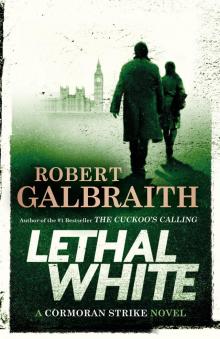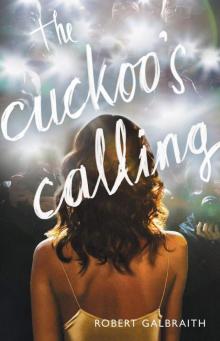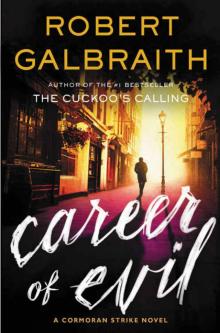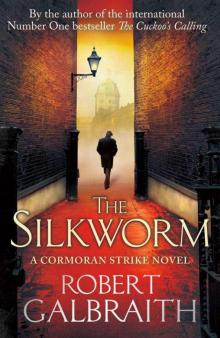- Home
- Robert Galbraith
Lethal White Page 15
Lethal White Read online
Page 15
“Oh, shit,” said Izzy, dashing over and scooping them up, while Robin closed the door behind her. As she tapped the fallen papers back into a neat stack on her desk, Izzy said:
“I’m thrilled Papa’s brought you in. He’s been under so much strain, which he really doesn’t need with everything we’ve got on now, but you and Strike will sort it out, won’t you? Winn’s a horrible little man,” said Izzy, reaching for a leather folder. “Inadequate, you know. How long have you worked with Strike?”
“A couple of years,” said Robin, as she undid the package Izzy had given her.
“I’ve met him, did he tell you? Yah—I was at school with his ex, Charlie Campbell. Gorgeous but trouble, Charlie. D’you know her?”
“No,” said Robin. A long-ago near-collision outside Strike’s office had been her only contact with Charlotte.
“I always quite fancied Strike,” said Izzy.
Robin glanced around, surprised, but Izzy was matter-of-factly inserting papers into the folder.
“Yah, people couldn’t see it, but I could. He was so butch and so… well… unapologetic.”
“Unapologetic?” Robin repeated.
“Yah. He never took any crap from anyone. Didn’t give a toss that people thought he wasn’t, you know—”
“Good enough for her?”
As soon as the words escaped her, Robin felt embarrassed. She had felt suddenly strangely protective of Strike. It was absurd, of course: if anybody could look after themselves, it was he.
“S’pose so,” said Izzy, still waiting for her papers to print. “It’s been ghastly for Papa, these past couple of months. And it isn’t as though what he did was wrong!” she said fiercely. “One minute it’s legal, the next it isn’t. That’s not Papa’s fault.”
“What wasn’t legal?” asked Robin innocently.
“Sorry,” Izzy replied, pleasantly but firmly. “Papa says, the fewer people know, the better.”
She peeked through the net curtains at the sky. “I won’t need a jacket, will I? No… sorry to dash, but Papa needs these and he’s off to meet Olympic sponsors at ten. Good luck.”
And in a rush of flowered fabric and tousled hair, she was gone, leaving Robin curious but strangely reassured. If Izzy could take this robust view of her father’s misdemeanor, it surely could not be anything dreadful—always assuming, of course, that Chiswell had told his daughter the truth.
Robin ripped the last piece of wrapping from the small parcel Izzy had given her. It contained, as she had known it would, the half-dozen listening devices that Strike had given to Jasper Chiswell over the weekend. As a Minister of the Crown, Chiswell was not required to pass through the security scanner every morning, as Robin was. She examined the bugs carefully. They had the appearance of normal plastic power points, and were designed to be fitted over genuine plug sockets, allowing the latter to function as normal. They would begin to record only when somebody spoke in their vicinity. She could hear her own heartbeat in the silence left by Izzy’s departure. The difficulty of her task was only just beginning to sink in.
She took off her coat, hung it up, then removed from her shoulder bag a large box of Tampax, which she had brought for the purpose of concealing the listening devices she wasn’t using. After hiding all but one of the bugs inside it, she placed the box in the bottom drawer of her desk. Next, she searched the cluttered shelves until she found an empty box file, in which she hid the remaining device beneath a handful of letters with typos that she took out of a pile labeled “for shredding.” Thus armed, Robin took a deep breath and left the room.
Winn’s door had opened since she had arrived. As Robin walked past, she saw a tall young Asian man wearing thick-lensed glasses and carrying a kettle.
“Hi!” said Robin at once, imitating Izzy’s bold, cheery approach. “I’m Venetia Hall, we’re neighbors! Who are you?”
“Aamir,” muttered the other, in a working-class London accent. “Mallik.”
“Do you work for Della Winn?” asked Robin.
“Yeah.”
“Oh, she’s so inspirational,” gushed Robin. “One of my heroines, actually.”
Aamir did not reply, but radiated a desire to be left alone. Robin felt like a terrier trying to harass a racehorse.
“Have you worked here long?”
“Six months.”
“Are you going to the café?”
“No,” said Aamir, as though she had propositioned him, and he turned sharply away towards the bathroom.
Robin walked on, holding her box file, wondering whether she had imagined animosity rather than shyness in the young man’s demeanor. It would have been helpful to make a friend in Winn’s office. Having to pretend to be an Izzy-esque goddaughter of Jasper Chiswell was hampering her. She couldn’t help but feel that Robin Ellacott from Yorkshire might have befriended Aamir more easily.
Having set off with fake purpose, she decided to explore for a while before returning to Izzy’s office.
Chiswell’s and Winn’s offices were in the Palace of Westminster itself, which, with its vaulted ceilings, libraries, tearooms and air of comfortable grandeur, might have been an old university college.
A half-covered passageway, watched over by large stone statues of a unicorn and lion, led to an escalator to Portcullis House. This was a modern crystal palace, with a folded glass roof, triangular panes held in place by thick black struts. Beneath was a wide, open-plan area including a café, where MPs and civil servants mingled. Flanked by full-grown trees, large water features consisting of long blocks of covered-in shallow pools became dazzling strips of quicksilver in the June sunshine.
There was a shiver of ambition in the thrumming air, and the sense of being part of a vital world. Beneath the ceiling of artfully fragmented glass, Robin passed political journalists perched on leather benches, all of whom were checking or talking on their mobiles, typing onto laptops or intercepting politicians for comment. Robin wondered whether she might have enjoyed working here if she had never been sent to Strike.
Her explorations ended in the third, dingiest and least interesting of the buildings that housed MPs’ offices, which resembled nothing so much as a three-star hotel, with worn carpets and cream walls and row upon row of identical doors. Robin doubled back, still clutching her file, and passed Winn’s door again fifty minutes after she had last seen it. Quickly checking that the corridor was deserted, she pressed her ear against the thick oak and thought she heard movement within.
“How’s it going?” asked Izzy, when Robin re-entered her office a couple of minutes later.
“I haven’t seen Winn yet.”
“He might be over at DCMS. He goes to see Della on any excuse,” said Izzy. “Fancy a coffee?”
But before she could leave her desk, her telephone rang.
While Izzy fielded a call from an irate constituent who had been unable to secure tickets for the Olympic diving—“yes, I like Tom Daley, too,” she said, rolling her eyes at Robin, “but it’s a lottery, madam”—Robin spooned out instant coffee and poured UHT milk, wondering how many times she had done this in offices she hated, and feeling suddenly extraordinarily grateful that she had escaped that life forever.
“Hung up,” said Izzy indifferently, setting down the receiver. “What were we talking about? Oh, Geraint, yah. He’s furious Della didn’t make him a SPAD.”
“What’s a SPAD?” Robin asked, setting Izzy’s coffee down and taking a seat at the other desk.
“Special Adviser. They’re like temporary civil servants. Lots more prestige, but you don’t hand the posts out to family, it’s not done. Anyway, Geraint’s hopeless, she wouldn’t want him even if it were possible.”
“I just met the man who works with Winn,” said Robin. “Aamir. He wasn’t too friendly.”
“Oh, he’s odd,” said Izzy, dismissively. “Barely civil to me. It’s probably because Geraint and Della hate Papa. I’ve never really got to the bottom of why, but they seem to hate all of us—oh, that
reminds me: Papa texted a minute ago. My brother Raff’s going to be coming in later this week, to help out in here. Maybe,” Izzy added, though she did not sound particularly hopeful, “if Raff’s any good, he might be able to take over from me. But Raff doesn’t know anything about the blackmail or who you really are, so don’t say anything, will you? Papa’s got about fourteen godchildren. Raff’ll never know the difference.”
Izzy sipped her coffee again, then, suddenly subdued, she said:
“I suppose you know about Raff. It was all over the papers. That poor woman… it was awful. She had a four-year-old daughter…”
“I did see something,” said Robin, noncommittally.
“I was the only one in the family who visited him in jail,” said Izzy. “Everyone was so disgusted by what he’d done. Kinvara—Papa’s wife—said he should have got life, but she’s got no idea,” she continued, “how ghastly it was in there… people don’t realize what prison’s like… I mean, I know he did a terrible thing, but…”
Her words trailed away. Robin wondered, perhaps ungenerously, whether Izzy was suggesting that jail was no place for a young man as refined as her half-brother. Doubtless it had been a horrible experience, Robin thought, but after all, he had taken drugs, climbed into a car and mown down a young mother.
“I thought he was working in an art gallery?” Robin asked.
“He’s gone and messed up at Drummond’s,” sighed Izzy. “Papa’s really taking him in to keep an eye on him.”
Public money paid for these salaries, Robin thought, remembering again the unusually short prison sentence the son of the minister had served for that drug-induced fatal accident.
“How did he mess up at the gallery?”
To her great surprise, Izzy’s doleful expression vanished in a sudden spurt of laughter.
“Oh, God, I’m sorry, I shouldn’t laugh. He shagged the other sales assistant in the loo,” she said, quaking with giggles. “I know it isn’t funny really—but he’d just got out of jail, and Raff’s lovely looking and he’s always pulled anyone he wants. They shoved him into a suit and put him in close proximity with some pretty little blonde art graduate, what did they think was going to happen? But as you can imagine, the gallery owner wasn’t too chuffed. He heard them going at it and put Raff on a final warning. Then Raff and the girl went and did it again, so Papa had a total fit and says he’s coming here instead.”
Robin didn’t feel particularly amused, but Izzy appeared not to notice, lost in her own thoughts.
“You never know, it could be the making of them, Papa and Raff,” she said hopefully, then checked her watch.
“Better return some calls,” she sighed, setting down her coffee mug, but as she reached for her phone she froze, fingers on the receiver as a sing-song male voice rang out in the corridor beyond the closed door.
“That’s him! Winn!”
“Well, here I go,” said Robin, snatching up her box file again.
“Good luck!” whispered Izzy.
Emerging into the corridor, Robin saw Winn standing in the doorway of his office, apparently talking to Aamir, who was inside. Winn was holding a folder with orange lettering on it saying “The Level Playing Field.” At the sound of Robin’s footsteps, he turned to face her.
“Well, hello there,” he said with a Cardiff lilt, stepping back into the corridor.
His gaze dribbled down Robin’s neck, fell onto her breasts, then up again to her mouth and her eyes. Robin knew him from that single look. She had met plenty of them in offices, the type who watched you in a way that made you feel clumsy and self-conscious, who would place a hand in the small of the back as they sidled behind you or ushered you through doors, who peered over your shoulder on the excuse of reading your monitor and made chancy little comments on your clothes that progressed to comments on your figure during after-work drinks. They cried “joke!” if you got angry, and became aggressive in the face of complaints.
“Where d’you fit in, then?” asked Geraint, making the question sound salacious.
“I’m interning for Uncle Jasper,” said Robin, smiling brightly.
“Uncle Jasper?”
“Jasper Chiswell, yes,” said Robin, pronouncing the name, as the Chiswells did themselves, “Chizzle.” “He’s my godfather. Venetia Hall,” said Robin, holding out her hand.
Everything about Winn seemed faintly amphibian, down to his damp palm. He was less like a gecko in the flesh, she thought, and more like a frog, with a pronounced potbelly and spindly arms and legs, his thinning hair rather greasy.
“And how did it come about that you’re Jasper’s goddaughter?”
“Oh, Uncle Jasper and Daddy are old friends,” said Robin, who had a full backstory prepared.
“Army?”
“Land management,” said Robin, sticking to her prearranged story.
“Ah,” said Geraint; then, “Lovely hair. Is it natural?”
“Yes,” said Robin.
His eyes slid down her body again. It cost Robin an effort to keep smiling at him. At last, gushing and giggling until her check muscles ached, agreeing that she would indeed give him a shout should she need any assistance, Robin walked on down the corridor. She could feel him watching her until she turned out of sight.
Just as Strike had felt after discovering Jimmy Knight’s litigious habits, Robin was sure that she had just gained a valuable insight into Winn’s weakness. In her experience, men like Geraint were astoundingly prone to believe that their scattergun sexual advances were appreciated and even reciprocated. She had spent no inconsiderable part of her temping career trying to rebuff and avoid such men, all of whom saw lubricious invitations in the merest pleasantry, and for whom youth and inexperience were an irresistible temptation.
How far, she asked herself, was she prepared to go in her quest to find out things to Winn’s discredit? Walking with sham purpose through endless corridors to support her pretense of having papers to deliver, Robin pictured herself leaning over his desk while the inconvenient Aamir was elsewhere, breasts at eye-level, asking for help and advice, giggling at smutty jokes.
Then, with a sudden, dreadful lurch of imagination she saw, clearly, Winn’s lunge, saw the sweaty face swooping for her, its lipless mouth agape, felt hands gripping her arms, pinning them to her sides, felt the potbelly press itself into her, squashing her backwards into a filing cabinet…
The endless green of carpet and chairs, the dark wood arches and the square panels seemed to blur and contract as Winn’s imagined pass became an attack. She pushed through the door ahead as though she could physically force herself past her panic…
Breathe. Breathe. Breathe.
“Bit overwhelming the first time you see it, eh?”
The man sounded kindly and not very young.
“Yes,” said Robin, barely knowing what she said. Breathe.
“Temporary, eh?” And then, “You all right, dear?”
“Asthma,” said Robin.
She had used the excuse before. It gave her an excuse to stop, to breathe deeply, to re-anchor herself to reality.
“Got an inhaler?” asked the elderly steward in concern.
He wore a frock coat, white tie and tails and an ornate badge of office. In his unexpected grandeur, Robin thought wildly of the white rabbit, popping up in the middle of madness.
“I left it in my office. I’ll be fine. Just need a second…”
She had blundered into a blaze of gold and color that was increasing her feeling of oppression. The Members’ Lobby, that familiar, ornate, Victorian-gothic chamber she had seen on television, stood right outside the Commons, and on the periphery of her vision loomed four gigantic bronze statues of previous prime ministers—Thatcher, Atlee, Lloyd George and Churchill—while busts of all the others lined the walls. They appeared to Robin like severed heads and the gilding, with its intricate tracery and richly colored embellishments, danced around her, jeering at her inability to cope with its ornate beauty.
She
heard the scraping of a chair’s legs. The steward had brought her a seat and was asking a colleague to fetch a glass of water.
“Thank you… thank you…” said Robin numbly, feeling inadequate, ashamed and embarrassed. Strike must never know about this. He would send her home, tell her she wasn’t fit to do the job. Nor must she tell Matthew, who treated these episodes as shameful, inevitable consequences of her stupidity in continuing surveillance work.
The steward talked to her kindly while she recovered and within a few minutes she was able to respond appropriately to his well-intentioned patter. While her breathing returned to normal, he told her the tale of how Edward Heath’s bust had begun to turn green on the arrival of the full-sized Thatcher statue beside him, and how it had had to be treated to turn it back to its dark brown bronze.
Robin laughed politely, got to her feet and handed him the empty glass with renewed thanks.
What treatment would it take, she wondered as she set off again, to return her to what she had once been?
14
… how happy I should feel if I could succeed in bringing a little light into all this murky ugliness.
Henrik Ibsen, Rosmersholm
Strike rose early on Tuesday morning. After showering, putting on his prosthesis and dressing, he filled a thermos with dark brown tea, took the sandwiches he had made the previous evening out of the fridge, stowed them in a carrier bag along with two packets of Club biscuits, chewing gum and a few bags of salt and vinegar crisps, then headed out into the sunrise and off to the garage where he kept his BMW. He had an appointment for a haircut at half past twelve, with Jimmy Knight’s ex-wife, in Manchester.
Once settled in the car, his bag of provisions within easy reach, Strike pulled on the trainers he kept in the car, which gave his fake foot better purchase on the brake. He then took out his mobile and began to compose a text to Robin.

 Lethal White
Lethal White The Cuckoo's Calling
The Cuckoo's Calling Career of Evil
Career of Evil The Silkworm
The Silkworm